
Lesbian, gay, bisexual, and transgender (LGBT) rights in Croatia have expanded in recent years, but LGBT persons may still face some legal challenges not experienced by non-LGBT residents. The status of same-sex relationships was first formally recognized in 2003 under a law dealing with unregistered cohabitations. As a result of a 2013 referendum, Croatia's Constitution defines marriage solely as a union between a woman and man, effectively prohibiting same-sex marriage. Since the introduction of the Life Partnership Act in 2014, same-sex couples have effectively enjoyed rights equal to heterosexual married couples in almost all of its aspects. In 2022, a final court judgement allows same-sex couples to adopt children under the same conditions as everyone else. Same-sex couples in Croatia can also apply for foster care since 2020. Croatia bans all discrimination on the grounds of sexual orientation, gender identity, and gender expression.
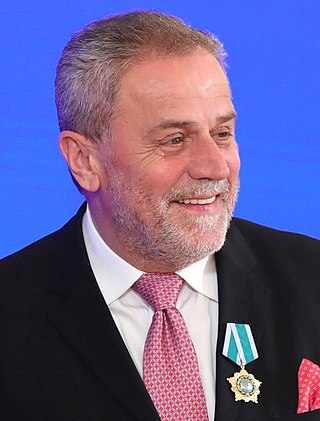
Milan Bandić was a Croatian politician and the longest-serving mayor of Zagreb, the capital of Croatia. Bandić was mayor almost continuously from 2000 to 2021, except during the time between his resignation in 2002 and the 2005 election. He was also suspended from exercising his powers and duties for several months after his 2014 arrest over a corruption scandal. Out of Bandić's multifaceted engagement in politics, the most noted part was his mayoralty of Zagreb, which followed the Croatian Democratic Union's (HDZ) first post-socialist period of government (1990–2000), and exacerbated many existing transitional problems in the city.

Jelena Karleuša is a Serbian singer and media personality. Born and raised in Belgrade, she rose to prominence upon the release of her debut album Ogledalce in 1995, which was succeeded by five more records released in quick succession to moderate success.
Jelena Veljača is a Croatian actress and screenwriter, currently writing a weekly column for Nedjeljni Jutarnji.
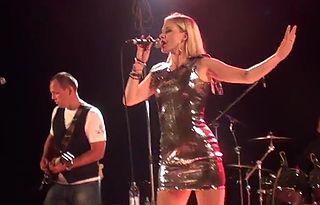
Jelena Rozga is a Croatian pop, folk, and electropop singer. Born and raised in Split, Croatia, Rozga was a ballet dancer as a child. She rose to fame in 1996, when she became the lead singer of Magazin, a pop band famous in Croatia. She served as the band's lead singer until 2006, releasing a total of five studio albums. During the ten years, the band released numerous commercially and critically successful singles including "Ginem", "Minut' srca tvog" and "Minus i plus" among others.

Abortion-rights movements, also referred to as pro-choice movements, advocate for the right to have legal access to induced abortion services including elective abortion. They seek to represent and support women who wish to terminate their pregnancy without fear of legal or social backlash. These movements are in direct opposition to anti-abortion movements.
Networked feminism is a phenomenon that can be described as the online mobilization and coordination of feminists in response to sexist, misogynistic, racist, and other discriminatory acts against minority groups. This phenomenon covers all possible definitions of what feminist movements may entail, as there have been multiple waves of feminist movements and there is no central authority to control what the term "feminism" claims to be. While one may hold a different opinion from another on the definition of "feminism", all those who believe in these movements and ideologies share the same goal of dismantling the current patriarchal social structure, where men hold primary power and higher social privileges above all others. Networked feminism is not spearheaded by one singular women's group. Rather, it is the manifestation of feminists' ability to leverage the internet to make traditionally unrepresented voices and viewpoints heard. Networked feminism occurs when social network sites such as Facebook, Twitter and Tumblr are used as a catalyst in the promotion of feminist equality and in response to sexism. Users of these social media websites promote the advancement of feminism using tools such as viral Facebook groups and hashtags. These tools are used to push gender equality and call attention to those promoting anything otherwise. Online feminist work is a new engine of contemporary feminism. With the possibility of connecting and communicating all around the world through the Internet, no other form of activism in history has brought together and empowered so many people to take action on a singular issue.
Black Twitter is an internet community largely consisting of African-American users on the social network Twitter focused on issues of interest to the black community in the United States. Feminista Jones described it in Salon as "a collective of active, primarily African-American Twitter users who have created a virtual community proving adept at bringing about a wide range of sociopolitical changes." A similar Black Twitter community grew in South Africa in the early 2010s.
Hashtag activism refers to the use of Twitter's hashtags for Internet activism. The hashtag has become one of the many ways that social media contributes to civic engagement and social movements. The use of the hashtag on social media provides users with an opportunity to share information and opinions about social issues in a way that others (followers) can interact and engage as part of a larger conversation with the potential to create change. The hashtag itself consists of a word or phrase that is connected to a social or political issue, and fosters a place where discourse can occur. Social media, provides an important platform for historically marginalized populations. Through the use of hashtags these groups are able to communicate, mobilize, and advocate for issues less visible to the mainstream.
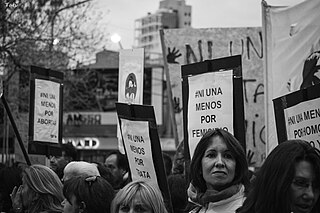
Ni una menos is a Latin American fourth-wave grassroots feminist movement, which started in Argentina and has spread across several Latin American countries, that campaigns against gender-based violence. In its official website, Ni una menos defines itself as a "collective scream against machista violence." The campaign was started by a collective of Argentine female artists, journalists and academics, and has grown into "a continental alliance of feminist forces". The movement regularly holds protests against femicides, but has also touched on topics such as gender roles, sexual harassment, gender pay gap, sexual objectification, legality of abortion, sex workers' rights and transgender rights.

#SayHerName is a social movement that seeks to raise awareness for Black Women victims of police brutality and anti-Black violence in the United States. The movement's name originally was created by the African American Policy Forum (AAPF). According to research, black women are 17% more likely to be stopped by police and 150% more likely to be killed than their white counterparts. #SayHerName aims to highlight the gender-specific ways in which Black women are disproportionately affected by fatal acts of racial injustice. In an effort to create a large social media presence alongside existing racial justice campaigns, such as #BlackLivesMatter and #BlackGirlsMatter, the African American Policy Forum (AAPF) coined the hashtag #SayHerName in December 2014.
Fourth-wave feminism is a feminist movement that began around 2012 and is characterized by a focus on the empowerment of women, the use of internet tools, and intersectionality. The fourth wave seeks greater gender equality by focusing on gendered norms and the marginalization of women in society.
#MeToo is a social movement against sexual abuse, sexual harassment, and rape culture, in which people publicize their experiences of sexual abuse or sexual harassment. The phrase "Me Too" was initially used in this context on social media in 2006, on Myspace, by sexual assault survivor and activist Tarana Burke. Harvard University published a case study on Burke, called "Leading with Empathy: Tarana Burke and the Making of the Me Too Movement" (2020). The hashtag #MeToo was used starting in 2017 as a way to draw attention to the magnitude of the problem.
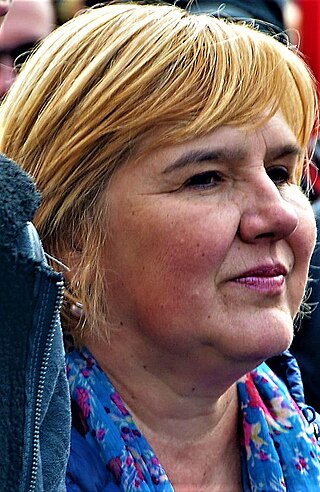
Željka Markić is a leader of Croatian right-wing movement U ime obitelji.
The You Know Me movement is a 2019 movement by abortion rights advocates in the United States to fight abortion stigma. A similar campaign and movement from 2015 is called #ShoutYourAbortion.
#MenToo is a social movement in India which was started against false sexual harassment allegations in MeToo movement in India. The movement was widely spread out after Bollywood actress Pooja Bedi and Founder of Purush Aayog Barkha Trehan appealed to bring gender neutral laws and investigation, after actor Karan Oberoi was arrested on 5 May 2019 due to a sexual harassment complaint filed against him by his ex-girlfriend.

The Homeland Movement, previously known as Miroslav Škoro Homeland Movement until February 2021, is a nationalist and right-wing populist political party in Croatia. The DP was founded by Croatian singer, former Croatian Democratic Union MP, and 2019–20 presidential election, Miroslav Škoro, on 29 February 2020.
Do not let Belgrade drown is a green political organization in Serbia.
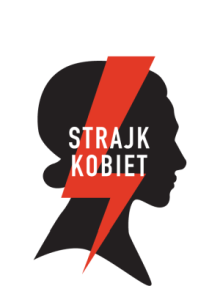
The All-Poland Women's Strike or Polish Women's Strike is a women's rights social movement in Poland, established in September 2016. It was set up in protest against the rejection by the Sejm of the Polish Parliament of the bill "Save Women", which was considered by the Sejm in parallel to the project "Stop Abortion". The movement was responsible for the organization of Black Monday, a protest action, involving various forms of strike, that took place simultaneously in 147 Polish cities, towns and villages.
The 2019 Croatian protests was an influx of movements and peaceful demonstrations in Zagreb, as part of a popular uprising against a surge in Violence against women and participated in rallies as part of the Spasime movement. The protests have been nicknamed the #Justice for Girls, #Save Me! Movement and #Me too! Movement.










